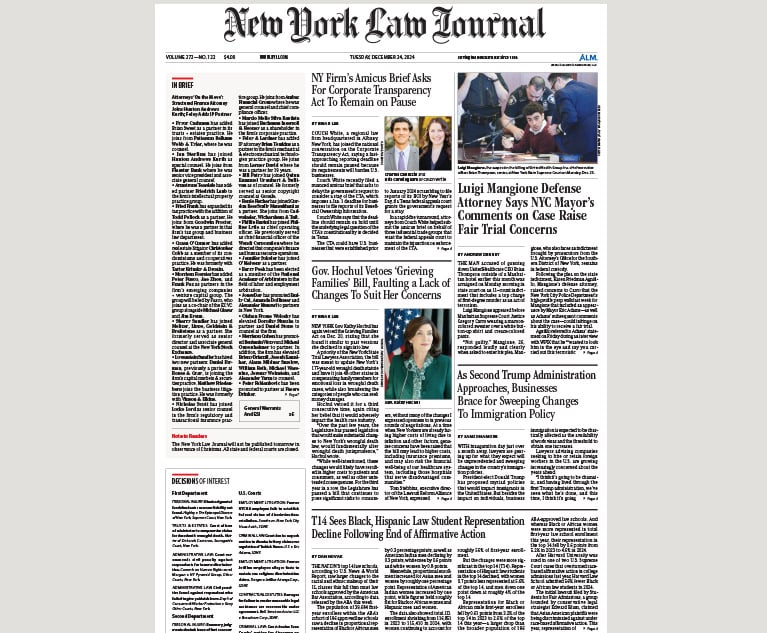 Keith Miller, office managing partner for Perkins Coie in New York. (Courtesy photo)
Keith Miller, office managing partner for Perkins Coie in New York. (Courtesy photo)Perkins Coie, Charting a Different Course, Grows in NY
The firm's emphasis on emerging companies and the blockchain industry has been a major source of growth for its New York office.
June 21, 2019 at 02:17 PM
4 minute read
When law firm leaders think about growing in New York City, they often think about the city's big-ticket industries: real estate, mergers and acquisitions, banking and insurance, to name a few. At Perkins Coie, office managing partner Keith Miller is thinking about blockchain.
Seattle-based Perkins Coie, whose $862 million in revenue makes it the 45th-highest grossing firm in the Am Law 100, set up shop in New York City with one lawyer in 2011 after having built up a presence across the U.S. and in China. On the East Coast, it's still best known for its Washington, D.C.-based political law practice, which counts the Democratic National Committee among its key clients.
But the firm is also working to stand out in the Big Apple. In an interview at the firm's new Sixth Avenue offices, Miller, who has led the office since 2016, described the unconventional approach he and his team have taken to more than doubling the firm's New York revenue over the past four years, and growing profits swiftly along the way. In 2012, Miller recalls, he barely knew what bitcoin was; now, cryptocurrencies and the technology that supports them bring in “tons and tons” of clients.
Early-stage companies need help getting incorporated and raising capital, Miller said, and as they mature, they may need help drafting contracts or terms of service, or help responding to an investigation. As they grow further, he said, it could mean mergers and acquisitions. Growth areas like blockchain are no less lucrative than more traditional areas of law, Miller said.
“There's so few attorneys that understand the blockchain and understand the technology behind it,” he said. “As a result, we don't see clients demanding decreased fees or large discounts.”
Perkins Coie has identified New York as one of its strategic growth offices, Miller explained, and while there are no specific head count numbers he's trying to hit, the new space has 80 single offices for attorneys across four floors, and the opportunity to grow across more floors.
According to numbers provided by the firm, Perkins Coie had about 50 people total—lawyers and staff—in New York in 2015, and the office brought in a total of about $17.7 million in revenue and recorded $3.4 million in net income that year. That sum is what remains after rent, associate and staff salaries and expenses are paid, but before any payments to partners, a firm spokesman said.
Last year, total head count in New York grew to about 100, office revenue hit $36.6 million, and net income hit $15.8 million. Compared to 2017, revenue was up 12% and net income was up 18%. That beats the nearly 10% growth in revenue recorded for the firm as a whole in the same period.
On one hand, it is fitting for a firm with clients like Microsoft, Amazon and Intel to focus on new technologies. Among the 58 New York lawyers listed on Perkins Coie's website, 15 are in its blockchain technology and digital currency group. Public records show that its clients in those fields include payment processor BitPay, the nonprofit Bitcoin Foundation, the securities token firm Polymath Inc. and Overstock.com, which has invested in blockchain technology in addition to its traditional retail focus.
On the other hand, it's rare for a firm to staff its New York office so lightly when it comes to old mainstay practices and industries. Compare the tech head counts to just five attorneys listed in M&A, three in private equity and seven listed in bankruptcy.
Miller said the firm is open to hiring in such areas, recently adding trust and estates partner Lois Tilton. But he said bankruptcy is “not a practice we're going to concentrate on” because the office's client base is growing rather than struggling.
Other recent laterals in New York include John Delaney, a technology transactions and privacy lawyer from Morrison Foerster, and Kari Larsen, a former enforcement lawyer at the Commodity Futures Trading Commission.
This content has been archived. It is available through our partners, LexisNexis® and Bloomberg Law.
To view this content, please continue to their sites.
Not a Lexis Subscriber?
Subscribe Now
Not a Bloomberg Law Subscriber?
Subscribe Now
NOT FOR REPRINT
© 2024 ALM Global, LLC, All Rights Reserved. Request academic re-use from www.copyright.com. All other uses, submit a request to [email protected]. For more information visit Asset & Logo Licensing.
You Might Like
View All

As Second Trump Administration Approaches, Businesses Brace for Sweeping Changes to Immigration Policy

As 'Red Hot' 2024 for Legal Industry Comes to Close, Leaders Reflect and Share Expectations for Next Year
7 minute readTrending Stories
Who Got The Work
Michael G. Bongiorno, Andrew Scott Dulberg and Elizabeth E. Driscoll from Wilmer Cutler Pickering Hale and Dorr have stepped in to represent Symbotic Inc., an A.I.-enabled technology platform that focuses on increasing supply chain efficiency, and other defendants in a pending shareholder derivative lawsuit. The case, filed Oct. 2 in Massachusetts District Court by the Brown Law Firm on behalf of Stephen Austen, accuses certain officers and directors of misleading investors in regard to Symbotic's potential for margin growth by failing to disclose that the company was not equipped to timely deploy its systems or manage expenses through project delays. The case, assigned to U.S. District Judge Nathaniel M. Gorton, is 1:24-cv-12522, Austen v. Cohen et al.
Who Got The Work
Edmund Polubinski and Marie Killmond of Davis Polk & Wardwell have entered appearances for data platform software development company MongoDB and other defendants in a pending shareholder derivative lawsuit. The action, filed Oct. 7 in New York Southern District Court by the Brown Law Firm, accuses the company's directors and/or officers of falsely expressing confidence in the company’s restructuring of its sales incentive plan and downplaying the severity of decreases in its upfront commitments. The case is 1:24-cv-07594, Roy v. Ittycheria et al.
Who Got The Work
Amy O. Bruchs and Kurt F. Ellison of Michael Best & Friedrich have entered appearances for Epic Systems Corp. in a pending employment discrimination lawsuit. The suit was filed Sept. 7 in Wisconsin Western District Court by Levine Eisberner LLC and Siri & Glimstad on behalf of a project manager who claims that he was wrongfully terminated after applying for a religious exemption to the defendant's COVID-19 vaccine mandate. The case, assigned to U.S. Magistrate Judge Anita Marie Boor, is 3:24-cv-00630, Secker, Nathan v. Epic Systems Corporation.
Who Got The Work
David X. Sullivan, Thomas J. Finn and Gregory A. Hall from McCarter & English have entered appearances for Sunrun Installation Services in a pending civil rights lawsuit. The complaint was filed Sept. 4 in Connecticut District Court by attorney Robert M. Berke on behalf of former employee George Edward Steins, who was arrested and charged with employing an unregistered home improvement salesperson. The complaint alleges that had Sunrun informed the Connecticut Department of Consumer Protection that the plaintiff's employment had ended in 2017 and that he no longer held Sunrun's home improvement contractor license, he would not have been hit with charges, which were dismissed in May 2024. The case, assigned to U.S. District Judge Jeffrey A. Meyer, is 3:24-cv-01423, Steins v. Sunrun, Inc. et al.
Who Got The Work
Greenberg Traurig shareholder Joshua L. Raskin has entered an appearance for boohoo.com UK Ltd. in a pending patent infringement lawsuit. The suit, filed Sept. 3 in Texas Eastern District Court by Rozier Hardt McDonough on behalf of Alto Dynamics, asserts five patents related to an online shopping platform. The case, assigned to U.S. District Judge Rodney Gilstrap, is 2:24-cv-00719, Alto Dynamics, LLC v. boohoo.com UK Limited.
Featured Firms
Law Offices of Gary Martin Hays & Associates, P.C.
(470) 294-1674
Law Offices of Mark E. Salomone
(857) 444-6468
Smith & Hassler
(713) 739-1250







